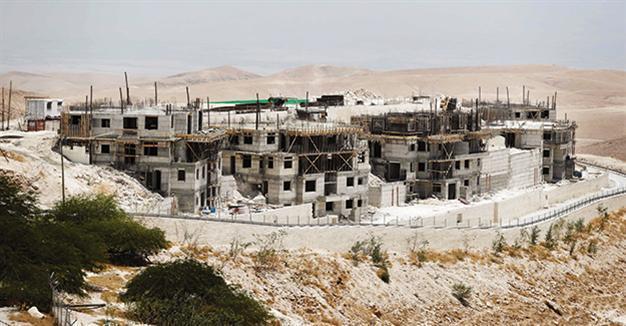Israel OKs new settler homes in West Bank
JERUSALEM - Agence France-Presse

AFP photo
Israel has approved hundreds of new settler homes in the occupied West Bank, an official said on July 4, in a move likely to further raise tensions following a series of Palestinian attacks.
The approval comes days after a key international report warned that Israel’s settlement expansion and land confiscation were eroding the possibility of a two-state solution to the conflict.
The report from the diplomatic Quartet -- the United States, European Union, United Nations and Russia -- also called on Palestinians to halt attacks and incitement to violence.
Under the new approval granted by Israeli Prime Minister Benjamin Netanyahu and Defense Minister Avigdor Lieberman, planning for 560 new homes in the large Maale Adumim settlement east of Jerusalem will be allowed to move forward.
The Maale Adumim mayor was informed of the decision on July 3 night, a spokesman for him told AFP. The settlement established in 1975 already includes a population of more than 37,000.
Netanyahu also gave approval for the planning of 240 new homes in east Jerusalem settlement neighborhoods, as well as for 600 units for Palestinians in the city’s Beit Safafa district, media reported.
The offices of Netanyahu and Lieberman refused to comment on the reports of the approvals for homes in east Jerusalem or Maale Adumim.
The decision follows calls among Israelis for a harsh response to a spate of Palestinian attacks in recent days.
On Jun 30, 13-year-old Israeli-American Hallel Yaffa Ariel was fatally stabbed in the settlement of Kiryat Arba on the outskirts of the flashpoint West Bank city of Hebron. Her 19-year-old Palestinian assailant was then shot dead by a security guard.
A day later, Sarah Tarayra, 27, was shot dead after drawing a knife on Israeli forces in Hebron. She was a relative of the Kiryat Arba attacker, and both were from Bani Naim, a village just outside Hebron.
Also on July 1, 48-year-old Israeli Michael Mark was killed after his car was fired on by suspected Palestinian gunmen south of Hebron.
Israel on July 1 announced a lockdown in Hebron as it searched for the gunmen and a reduction in monthly tax payments to the Palestinian Authority after the attacks.
The amount is to be cut by the equivalent of the fiscal support paid to militants’ families, Netanyahu’s office said.
Israel transfers around $127 million in customs duties levied on goods destined for Palestinian markets that transit through Israeli ports monthly.
The measures, which also included increasing Israel’s military presence in the West Bank, were described by the army as “the most substantial” in two years.
“We are using various means, including aggressivemeasures that we have not used in the past,” Netanyahu told a cabinet meeting on July 3.
“This includes cordoning off the entire Hebron district -- 700,000 people,” he said, referring to the city and surrounding area.
Checkpoints and closures were still in place at entrances to the city on July 4.
Hebron has long been a flashpoint in the conflict, with hundreds of Jewish settlers living under heavy military guard in the heart of the city among some 200,000 Palestinians.
A wave of violence since October has killed at least 214 Palestinians, 34 Israelis, two Americans, an Eritrean and a Sudanese.
Most of the Palestinians killed were carrying out knife, gun or car-ramming attacks, Israeli authorities say.
Others were shot dead by Israeli security forces during protests and clashes or killed in Israeli air strikes in the Gaza Strip.
The violence had subsided in recent weeks, but a deadly shooting at a cafe in Tel Aviv by two Palestinians on June 8 and last week’s series of attacks have raised concern.
During a recent visit to Israel and the Palestinian territories, U.N. chief Ban Ki-moon condemned Palestinian attacks as “terrorism” but also said Israel must act to address “key underlying causes of violence.”
They included “growing Palestinian anger, the paralysis of the peace process, the nearly a half-century of occupation,” Ban said.
Peace talks have been at a complete standstill since a U.S.-led initiative collapsed in April 2014.
